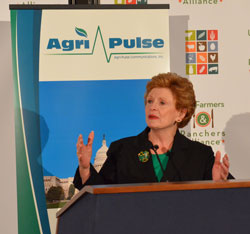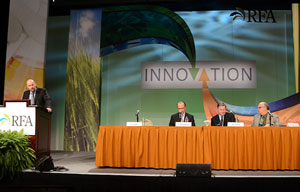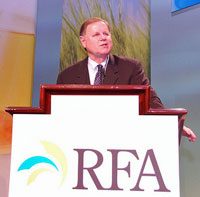Growth Energy welcomed two new board members this week during the ethanol organization’s 2012 Executive Leadership Conference in Las Vegas.
 Abe Hughes, Vice President North America of New Holland Agriculture, and Bob Casper, President of Ethanol Products, LLC, a subsidiary of POET Ethanol Products, both agreed to join the organization’s Board of Directors.
Abe Hughes, Vice President North America of New Holland Agriculture, and Bob Casper, President of Ethanol Products, LLC, a subsidiary of POET Ethanol Products, both agreed to join the organization’s Board of Directors.
“As one of the largest manufacturers of agriculture equipment in the world, New Holland Agriculture is a perfect fit for Growth Energy,” said Hughes. “Through our partnership with Growth Energy, we can make the ethanol industry even more efficient and profitable for both farmers and ethanol producers. New Holland fully supports the ethanol industry and its positive impact on the agriculture industry. Ethanol is good for the rural economy and for farmers.”
“The ethanol industry is focused on bringing E15 to the marketplace, giving consumers a choice at the pump and scaling the blend wall. As a member of Growth Energy’s board, I will focus on the next steps for E15 and higher ethanol blends in the future,” said Bob Casper. “Together, we can give Americans access to this clean, renewable fuel that will reduce our dependence on foreign oil and lower harmful emissions.”
“Bob and Abe both bring a unique perspective to the Growth Energy board, and we look forward to working with them moving forward,” said Growth Energy CEO Tom Buis. “They are both passionate advocates for agriculture and ethanol and we are delighted to work with them to create a coalition to bring higher ethanol blends and greater ethanol infrastructure to American consumers.”



 The
The 
 The debate over ethanol, greenhouse gases and land use continues – and that was the topic of a panel discussion at the recent 17th annual
The debate over ethanol, greenhouse gases and land use continues – and that was the topic of a panel discussion at the recent 17th annual  “The new thing is that we now have real world data,” Dr. Tyner said. He presented actual data from the U.S. Department of Agriculture showing that in the last six years the world has added 105 million of crop land – mostly corn, soybeans, rice, rapeseed and wheat. “So, markets work – that’s basically the bottom line,” said Tyner.
“The new thing is that we now have real world data,” Dr. Tyner said. He presented actual data from the U.S. Department of Agriculture showing that in the last six years the world has added 105 million of crop land – mostly corn, soybeans, rice, rapeseed and wheat. “So, markets work – that’s basically the bottom line,” said Tyner.  The Nebraska Ethanol Board
The Nebraska Ethanol Board 

